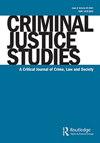工作倦怠和工作家庭冲突对狱警离职意向的影响
IF 1.1
Q3 OPERATIONS RESEARCH & MANAGEMENT SCIENCE
引用次数: 3
摘要
自愿惩教人员的更替可能会产生毁灭性的影响。离职意向通常是实际自愿离职前的最后一个阶段。在以往研究的基础上,本研究考察了工作-家庭冲突和工作倦怠对军官离职意向的影响,同时测试了这些影响是否被工作满意度和组织承诺所调节。数据来自对西南两所州立监狱的664名狱警的调查,并使用普通最小二乘回归进行分析。测量了基于时间和压力的工作-家庭冲突维度,以及情绪耗竭和人格解体的倦怠维度。工作家庭冲突和工作倦怠是离职意向的显著预测因子。当工作满意度和组织承诺加入模型后,工作倦怠不再显著,但工作-家庭冲突的两个测量值都显著。满意度和承诺均有显著负相关,是狱警离职意向的最佳预测因子。结果表明,需要努力提高军官的满意度和承诺,减少基于时间和压力的冲突,以降低离职意图。惩教服务的人员流失是一个国际性的问题,本研究的结果和政策意义具有国际适用性。本文章由计算机程序翻译,如有差异,请以英文原文为准。
Examining the effects of job burnout and work-family conflict on correctional officer turnover intent
ABSTRACT Voluntary correctional officer turnover can have devastating effects. Turnover intent is usually the last stage before actual voluntary turnover. Building upon past research, the current study examined the effects of work-family conflict and job burnout on the turnover intent of officers, while testing to see if these effects were moderated by job satisfaction and organizational commitment. Data came from a survey of 664 officers at two Southwestern state prisons and were analyzed using ordinary least squares regression. The time-based and strain-based dimensions of work-family conflict were measured, as were the burnout dimensions of emotional exhaustion and depersonalization. The measures of work-family conflict and job burnout were significant predictors of turnover intent. When job satisfaction and organizational commitment were added to the model job burnout was no longer significant, but both measures of work-family conflict were. Both satisfaction and commitment had significant negative associations and were the best predictors of correctional officer turnover intent. The results indicate that efforts are needed to raise satisfaction and commitment among officers and to lower time-based and strain-based conflict to reduce turnover intent. Turnover in correctional services is an international issue and the findings and policy implications of this study are internationally applicable.
求助全文
通过发布文献求助,成功后即可免费获取论文全文。
去求助
来源期刊

CRIMINAL JUSTICE STUDIES
OPERATIONS RESEARCH & MANAGEMENT SCIENCE-
CiteScore
2.80
自引率
5.60%
发文量
17
期刊介绍:
Criminal Justice Studies, a quarterly refereed journal, publishes articles that deal with substantive criminal justice and criminological issues. The journal welcomes all articles that are relevant to the issue of criminal justice, as well as those that may be outside the field but have relevancy to the topic of criminal justice. Articles that cover public administration, issues of public policy, as well as public affairs issues are welcome. The journal also publishes relevant literature reviews, research notes and summary reports of innovative research projects in criminal justice. Qualitative and quantifiable articles are sought mainly from academics and researchers in the field, though articles from professionals will also be considered.
 求助内容:
求助内容: 应助结果提醒方式:
应助结果提醒方式:


